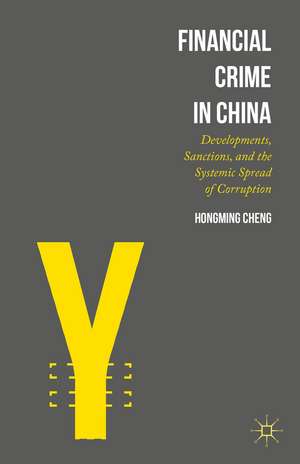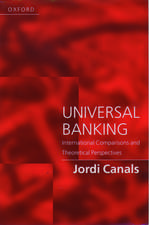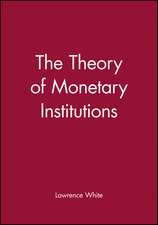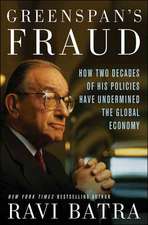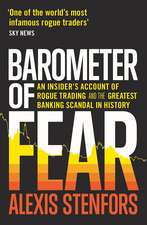Financial Crime in China: Developments, Sanctions, and the Systemic Spread of Corruption
Autor Hongming Chengen Limba Engleză Hardback – 17 noi 2015
Financial Crime in China builds upon original research into the topic and offers a never-before-seen look at the systemic spread of state-controlled corruption in the form of bank fraud, securities fraud, insider trading, and Ponzi schemes. Cheng presents an authentic picture of financial crime in China by identifying the latest manifestations, analyzing empirical data and case studies, and drawing conclusions about the origin, characteristics, dynamics, and developmental features of financial criminality in the context of political economy.
Preț: 639.59 lei
Preț vechi: 752.45 lei
-15% Nou
Puncte Express: 959
Preț estimativ în valută:
122.40€ • 127.32$ • 101.05£
122.40€ • 127.32$ • 101.05£
Carte tipărită la comandă
Livrare economică 15-29 aprilie
Preluare comenzi: 021 569.72.76
Specificații
ISBN-13: 9781137435293
ISBN-10: 1137435291
Pagini: 194
Ilustrații: XIV, 194 p.
Dimensiuni: 140 x 216 x 13 mm
Greutate: 0.4 kg
Ediția:1st ed. 2016
Editura: Palgrave Macmillan US
Colecția Palgrave Macmillan
Locul publicării:New York, United States
ISBN-10: 1137435291
Pagini: 194
Ilustrații: XIV, 194 p.
Dimensiuni: 140 x 216 x 13 mm
Greutate: 0.4 kg
Ediția:1st ed. 2016
Editura: Palgrave Macmillan US
Colecția Palgrave Macmillan
Locul publicării:New York, United States
Cuprins
1. The Financial System in China: Financial Sectors, State Influences and Opportunities for Crime
2. The Upper World
3. Banking Fraud
4. Securities Fraud
5. Informal Finance and Ponzi Schemes
6. Law and the Courts
7. Policing and Regulating Financial Crime
8. Financial Business Ethics and Professionalization in the Anomic Environment
9. Conclusion: Financial Crime and the "Chinese Century"
2. The Upper World
3. Banking Fraud
4. Securities Fraud
5. Informal Finance and Ponzi Schemes
6. Law and the Courts
7. Policing and Regulating Financial Crime
8. Financial Business Ethics and Professionalization in the Anomic Environment
9. Conclusion: Financial Crime and the "Chinese Century"
Recenzii
"Cheng has presented a multi-layered story of the forms of corruption and the party-state's measures against corruption in a highly dynamic China of today, full of risks and opportunities." - Liqun Cao, Professor of Sociology, University of Ontario Institute of Technology, co-editor of The Routledge Handbook of Chinese Criminology
"Despite its growing importance as both a domestic and international problem, white-collar crime in China remains relatively understudied among scholars throughout the world. Cheng provides a highly informative and detailed analysis of Chinese financial crime stemming from the fundamental incompatibility between the current market economy and China's continuing authoritarian rule. Drawing on official data, news reports, and case studies, the book challenges and expands upon current criminological notions of white-collar crime and offers numerous valuable insights for future research." - Henry N. Pontell, Distinguished Professor and Chair, Department of Sociology, John Jay College of Criminal Justice, USA; co-author of Profit Without Honor: White-Collar Crime and the Looting of America
"Despite its growing importance as both a domestic and international problem, white-collar crime in China remains relatively understudied among scholars throughout the world. Cheng provides a highly informative and detailed analysis of Chinese financial crime stemming from the fundamental incompatibility between the current market economy and China's continuing authoritarian rule. Drawing on official data, news reports, and case studies, the book challenges and expands upon current criminological notions of white-collar crime and offers numerous valuable insights for future research." - Henry N. Pontell, Distinguished Professor and Chair, Department of Sociology, John Jay College of Criminal Justice, USA; co-author of Profit Without Honor: White-Collar Crime and the Looting of America
Notă biografică
Hongming Cheng is Associate Professor of Crime, Law and Justice at the University of Saskatchewan, Canada; an Adjunct Senior Fellow at Käte Hamburger Kolleg/Centre for Global Cooperation Research, Germany; and an Edmond J. Safra Network Fellow at Harvard University, USA.
Textul de pe ultima copertă
Given China's rapid development, many observers assert that world economic growth and key economic indicators are now depending on the country alone, including the prospects of the dollar, the Euro, oil prices, industrial commodities, global equity markets and bond prices. On the other hand, China faces a number of major social and economic challenges which could undermine future growth, such as prevalent corruption, financial crime, and the relative lack of the rule of law.
Financial Crime in China builds upon original research into the topic and offers a never-before-seen look at the systemic spread of state-controlled corruption in the form of bank fraud, securities fraud, insider trading, and Ponzi schemes. Cheng presents an authentic picture of financial crime in China by identifying the latest manifestations, analyzing empirical data and case studies, and drawing conclusions about the origin, characteristics, dynamics, and developmental features of financial criminality in the context of political economy.
Financial Crime in China builds upon original research into the topic and offers a never-before-seen look at the systemic spread of state-controlled corruption in the form of bank fraud, securities fraud, insider trading, and Ponzi schemes. Cheng presents an authentic picture of financial crime in China by identifying the latest manifestations, analyzing empirical data and case studies, and drawing conclusions about the origin, characteristics, dynamics, and developmental features of financial criminality in the context of political economy.
